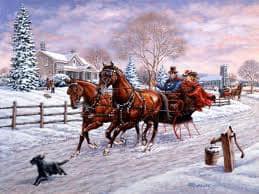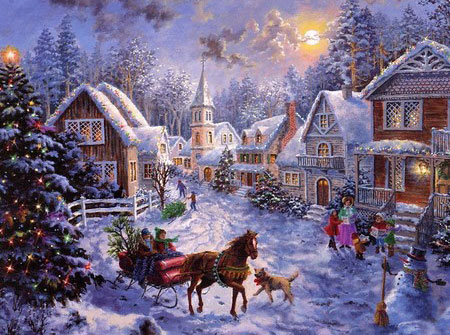
On a crisp October morning in 1871, twenty-six-year-old Rose Kingsley stepped from the train in Denver where she was met by her brother Maurice. The next day they traveled to Colorado Springs, where Maurice was employed by William Jackson Palmer, to spend the winter. Meanwhile, at the family home in England, Rose’s father, the eminent churchman and novelist Charles Kingsley, awaited her correspondences telling of her experiences in the West. Among these was a letter later published in her book SOUTH BY WEST, OR WINTER IN THE ROCKY MOUNTAINS AND SPRING IN MEXICO (1874), in which she described how she and her brother spent Christmas-in Denver with their friends one hundred years ago.

„Denver looks wintry enough, under six inches to a foot of snow; but it is full of life and bustle. The toy-shops are gay with preparations for Christmas-trees; the candy stores filled with the most attractive sweetmeats; the furriers display beaver coats, and mink, ermine, and sable, to tempt the cold passer-by.
„The streets are full of sleighs, each horse with its collar of bells; and all the little boys have manufactured or bought little sleds, which they tie to the back of any passing cart or carriage; and get whisked along the streets till some sharp turn or unusual roughness in the road upsets them.
We found plenty of old friends up here, and have made many more since we came. In the frank unconventional state of society which exists in the West, friendships are made much more easily than even in the Eastern States, or still more, in our English society; and, if one wants to have, as the Americans express it, 'a good time,’ one must expand a little out of one’s insularity, and meet the hearty good-will shown with some adequate response.
On Friday evening . . . we went out for a sleigh-drive, the first I have ever had; and most delightful it was. We were muffled up in blankets and buffalo robes and all our furs. The thermometer was 2° below zero; the moon as clear as day; and, with a capital pair of horses, we flew over the smooth sparkling snow, our sleigh-bells jingling in the frosty air.
I was asked to eat my Christmas dinner . . . where Miss J. boarded; and, simply because I was her friend, every one in the house made me welcome. Dinner of the orthodox turkey and mince-pie over, we were summoned to the Christmas-tree in the parlour, which was decorated, in place of our hollyberries, with strings of raw cranberries and snowy popcorns, pretty to look at, and nice to eat.
The evening passed with games and music, and constant refreshments in the shape of candy and hickory-nuts; and suddenly our host turned round to me and said, 'Now, I’ll sing something for you:’ and began the first verse of „God save the Queen.” It sent a thrill over me, hearing it a thousand miles west of the Mississippi for the first time since leaving England. And then I was made to sing it all through; for, though the tune is familiar enough in America, no one present knew the right words. It was a pleasant ending to a pleasant evening.”

Suggested by Arthur Glockner, Longmont, Colorado Courtesy of Mountain and Plain History Notes State Historical Society of Colorado.
ALMANAC, 1972
